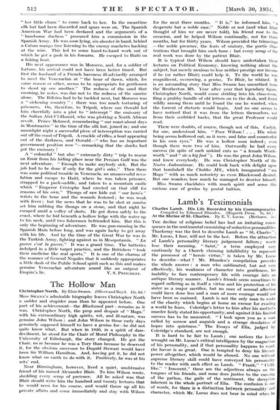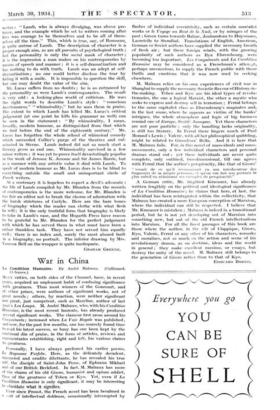Lamb's Testimonials
TILE decline of religious belief has had an irritating conse- quence in the sentimental canonizing of seductive personalities. Thackeray was the first to describe Lamb as " St. Charles ; Mr. Lucas, I fear, will not be the last. Before the attraction of Lamb's personality literary judgement falters ; words lose their meaning. " Saint," a term employed very cautiously by a Church claiming infallibility to represent the possessor of " heroic virtue," is taken by Mr. Lucas to describe—what ? Mr. Blunden's compilation provides the whole answer : a man who sublimated, but not very effectively, his weakness of character into gentleness, his inability to face contemporary life with courage into an antique literary manner. Lamb's friends seem sometimes to regard suffering as in itself a virtue and his protection of his sister as a major sacrifice, but no man of normal affection could have done less and a man of more courage would not have been so maimed. Lamb is not the only man to make of the charity which begins at home an excuse for evading a world he fears. Coleridge's letter to him after his mother's murder fairly stated his opportunity, and against it his limited success has to be measured. " I look upon you as a man called by sorrow and anguish and a strange desolation of hopes into quietness." The Essays of Elia, judged by Coleridge's standard, are not enough.
It is hard to be fair to Lamb ; one notices the havoc wrought on Mr. Lucas's critical intelligence by the magnet isni of his personality, and if that personality happens to repel, the havoc is as great. One is tempted to deny his literary power altogether, which would be absurd. No one without supreme literary skill could have conveyed his personality to the reader with such effect as Lamb. " Frank," " " Innocent," these are the adjectives always on the tongues of his friends, and none does justice to the cunning of the pathos, the guile of the sentiment, the deception inherent in the whole portrait of Elia. The confusion is one of words, for there is a distinction between personality and character, which Mr. Lucas does not bear in mind when he writes : " Lamb, who is always divulging, was above pre- tence, and the example which he set to writers coming after him was courage to be themselves and to be all of them- selves all.the time." This, which is true, say, of _Rousseau, is quite untrue of Lamb. The description of character is a proper enough aim, as are all. pursuits of psychological truth ; but the personality is only the social mask of character ; it is the impression a man makes on his contemporaries by means of speech and manner ; it is a self-dramatization and has nothing to do with truth. Lamb was an adept at self- dramatization ; no one could better disclose the tear by biding it with a smile. It is impossible to question the skill, but one may doubt the value of the aim.
Mr. Lucas suffers from no doubts ; he is as entranced by the personality as were Lamb's contemporaries. The result is very odd : a looking-glass world of criticism. He uses the right words to describe Lamb's style : " conscious facetiousness," " whimsicality," but he uses them in praise. The extent to which Lamb has killed Mr. Lucas's critical judgement (at one point he kills his grammar as well) can be seen in the statement : " By whimsicality, I mean, broadly, modem humour, as distinguished from that which we find before the end of the eighteenth century." Mr. Lucas has forgotten the whole school of whimsical comedy which succeeded Collier's 'purge of the theatres and cul- minated in Sterne. Lamb indeed did not so much start a literary genre as end one. Whimsicality survived in a few minor writers ; it was yet to prove itself devastatingly popular in the work of Jerome K. Jerome and Sir James Barrie, but as a manner with any artistic value it died with Lamb. To speak of modern humour as Mr. Lucas does is to be blind to everything outside the small and unimportant circle of Punch writers.
At a centenary it is hopeless to expect a devil's advocate ; the life of Lamb compiled by Mr. Blunden from the records of contemporaries is the more welcome, for Mr. Blunden is too fair an editor not to break the chorus of admiration with the harsh strictures of Carlyle. Here are the bare bones of biography which the reader can clothe with what flesh he will ; it is the only truthful form that biography is likely to take in Lamb's case, and the Hogarth Press have reason to he grateful to Mr. Blunden for the perfect judgement with which he has served them in what must have been a rather thankless task. They have not served him equally well ; there is no index and, surely the most absurd fault in a biography, no portrait. The inferior drawing by Mrs. Vanessa Bell on the wrapper is quite inadequate.
GRAHAM GREENE.









































 Previous page
Previous page